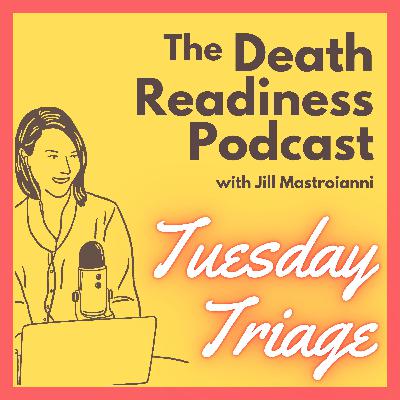How Small Gaps in Your Will Become Big Problems
Description
What happens if you forget to list something in your will, or if two people end up entitled to the same item, like a piece of jewelry? In this episode, Jill takes on two smart questions from her daughter, April, and unpacks the legal rules around tangible personal property, specific bequests, and residuary estates. Along the way, she shares practical takeaways to help you keep your family out of conflict.
What You’ll Learn in This Episode
- The role of a will. A will directs the distribution of your probate assets, the property titled in your name alone. But it doesn’t control everything. Retirement accounts with named beneficiaries, life insurance policies, or bank accounts with payable-on-death designations pass outside your will. Knowing what is and isn’t covered helps you avoid false confidence in your estate plan.
- Tangible personal property. These are the everyday items you can touch: jewelry, artwork, furniture, even napkin holders. Families sometimes fight more over sentimental objects than financial ones when emotion drives value. Without clear instructions, siblings may argue over who gets “Mom’s ring” or “Dad’s watch,” creating unnecessary conflict.
- Executor authority. A well-drafted will gives the executor power to step in when beneficiaries can’t agree. For example, the executor might sell an item and split the proceeds. Without this safety valve, disputes can stall the entire estate administration, forcing families into costly and time-consuming court battles.
- Specific bequests. Leaving a gift like “my diamond ring” sounds clear, but what if you own two diamond rings? Specific bequests need precise descriptions—metal type, design, even era—to avoid confusion. They also need instructions about what happens if the recipient dies first.
- Anti-lapse statutes. In many states, if a beneficiary dies before you but leaves descendants, those descendants inherit in original beneficiary’s place unless your will says otherwise. This rule can unintentionally split a single item, like a ring, between multiple beneficiaries, creating the very conflict you wanted to avoid.
- The residuary estate. Think of this as the “junk drawer” of your estate: everything not specifically mentioned goes here. The residuary clause prevents forgotten assets from slipping into intestacy, where state law (not you) decides who gets them.
- Clarity is your best defense against family conflict. Vague wording, missing clauses, or assumptions about the future can all lead to confusion, high legal costs, and strained relationships. A clear, precise will reduces the chance that your legacy becomes a source of stress or division.
Resources & Links
- Do You Need a Will? (Video) – A deeper dive into the basics of wills.
- Estate Planning Support Services – Learn how Jill can help you get organized, vet an attorney, and make your plan clear and manageable.
- Submit a Question for Tuesday Triage – Ask Jill to tackle your estate planning question on a future episode.
Connect with Jill:
- Website: DeathReadiness.com
- Email: jill@deathreadiness.com
- Learn more about Jill’s services
- Subscribe to the Death Readiness Dispatch!
- Submit a question for Tuesday Triage
Did you enjoy this episode? Share it with someone you care about.
This podcast provides estate planning guidance for women and discusses real, practical issues, from caregiving, pre-planning a funeral, how to avoid probate using beneficiary designations, planning for individuals with special needs (and special needs trusts), whether you need a professional fiduciary (trustee or executor), how the estate tax works and how to preserve your legacy.
Tuesday Triage episodes answer questions from listeners like you, from powers of attorney, healthcare advance directives (and whether they work when you’re pregnant), what a Last Will and Testament really is, whether you need a trust, how Medicaid works and how to have senior and elder care conversations and how to care for aging parents.
Disclaimer: This podcast and all related content are for educational purposes only and do not constitute legal advice. No attorney-client relationship is established here. Use of this information without careful analysis and review by your attorney, CPA, and/or financial advisor may cause serious adverse consequences. For legal guidance tailored to your unique situation, consult with a licensed attorney in your state.










